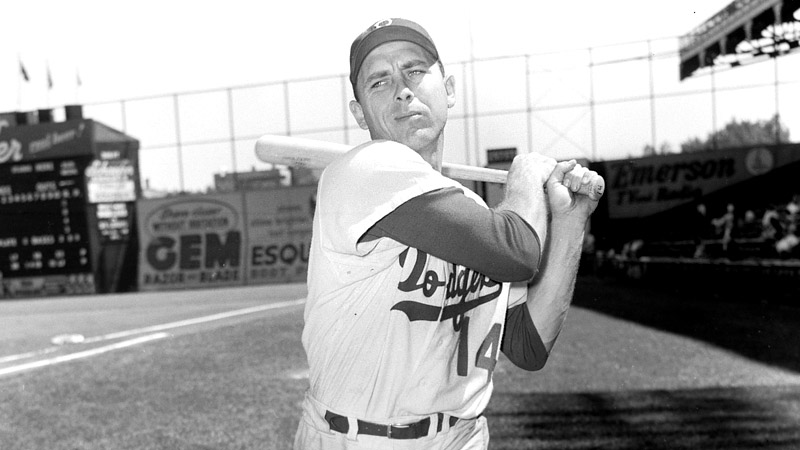 |
| Taking all of his accomplishments into consideration, Hodges is a Hall of Famer |
Scaling down the 50 percent sounds like a big drop-off, but it isn't when you consider that every player, except for one, who crossed that threshold was ultimately inducted into Cooperstown. That one player is Gil Hodges, of course, and he should be in, too. He spent 15 years on the ballot and exceeded 60 percent three times, topping out at 63.4 percent in his last try.
Now, a lot of people don't think Hodges is Hall-worthy because he wasn't dominant when he played. It is true that he never led the league in any significant offensive statistic of the day. That is reflected in his poor MVP showings--he never finished higher than seventh, and he was often overshadowed by his Hall of Fame teammates Roy Campanella (a three-time winner), Duke Snider and Jackie Robinson. His 120 career OPS+ is good but nothing special, tying him for 356th all-time with the likes of Willie Horton, Shawn Green, Paul O'Neill, and Richie Sexson, none of whom are getting into the Hall without a ticket.
But great defense at first base isn't nearly as valuable as great defense at premium positions,and looking strictly at Hodges' numbers, he doesn't quite measure up with his fellow first basemen. JAWS rates him 33rd all-time at the position, in the same neighborhood as Don Mattingly, Carlos Delgado, and Mark Grace. The only two Hall of Famers below him are Jim Bottomley and High Pockets Kelly, both of whom are considered to be among the weakest players in the Hall. There's not a single Hall of Famer among his ten most similar batters, a list that includes good-not-great players such as Norm Cash, George Foster, Jack Clark, Rocky Colavito, and Lee May. As a player, Hodges was very good but falls just short of the Hall.
But Hodges should get extra credit for his other accomplishments. He was one of the fabled "Boys of Summer" who brought Brooklyn its first and only World Series title in 1955. It was Hodges who plated both Dodger runs in Brooklyn's 2-0 victory in Game 7, giving Johnny Podres the run support he needed to beat the Yankees. One of the most popular players in Brooklyn history, Hodges returned to New York as one of the original members of the horrid '62 Mets, later managing them to their first World Series championship in 1969. He famously finished his career with more grand slams than anyone except for Lou Gehrig. When he retired his 370 home runs ranked tenth all-time and second only to another great first baseman--Jimmie Foxx--among righthanded hitters.
More importantly, Hodges was an outstanding teammate and human being, a class act who, like Stan Musial, played the game the right way and never caused trouble with anyone. When he died suddenly in 1972 at the age of 47, more than 10,000 people came to his wake. If the character clause can be used to keep Barry Bonds and Roger Clemens out, why can't it work the other way?
So yeah, I'll readily admit that on numbers alone, Hodges isn't a Hall of Famer. But throw his managerial skills and status as a Brooklyn legend, and I think that's just enough to put him over the top. Lord knows the Hall of Fame would be a better place with Hodges than without him.
I think the Hall of Fame election process should be similar to the presidential election, just electronic instead of on paper. You, me, and 10 million other Average-Joes could help show those old wizened writers(the "Electoral College") that maybe Sosa and McGwire and Bonds are still Hall-Worthy by being allowed to vote ourselves. Although the writers compiling 50% would still be the only way to get them in, we would be able to make our own opinions known in a much more dramatic manner than just commenting on blogs and hopefully influence their decisions. By the way, I agree that Hodges' denial is a crime.
ReplyDelete